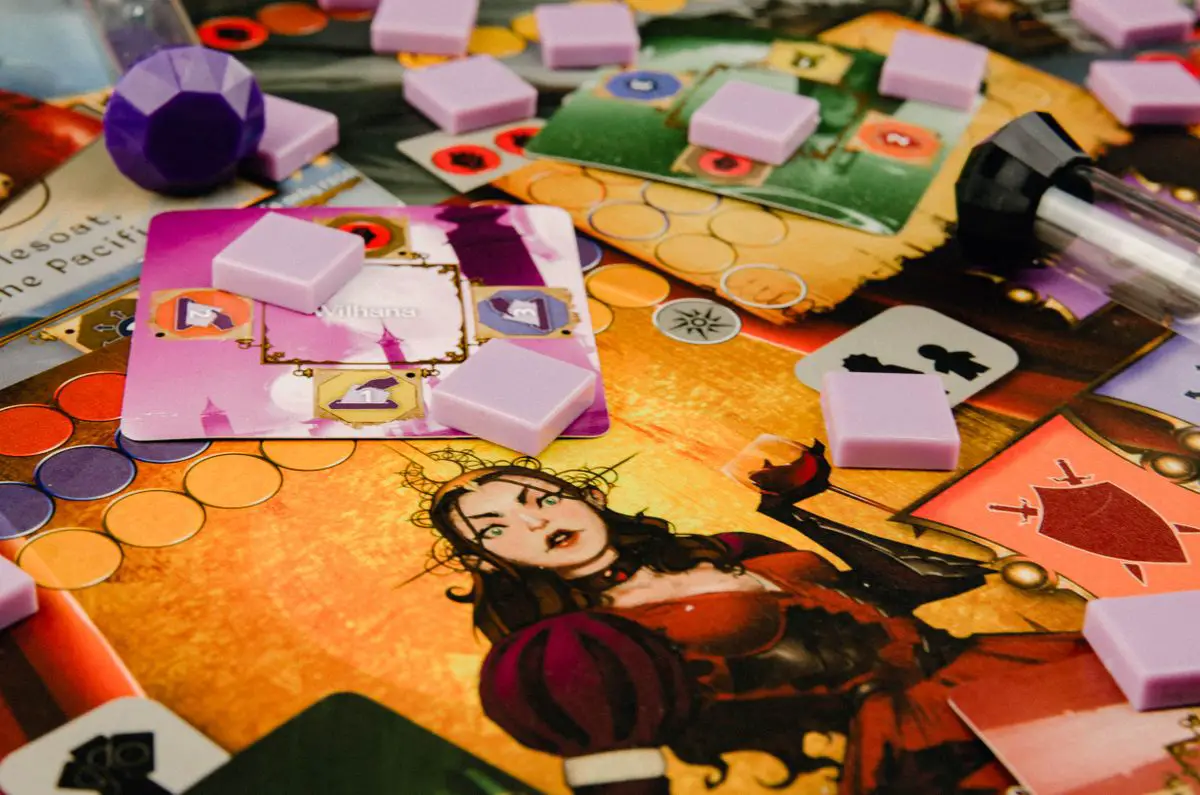I’ll admit, when I got a hold of Pendulum, one of Stonemaier’s big releases of 2020, I didn’t quite know what to make of it. It’s a weird game. The pitch is that its’ an asymmetrical worker placement game (ok, normal, I can dig that), but without turns and with time as a resource. TIME? How is real time going to affect us in any way other than how long we play? It was a daunting task, not helped by a seemingly complex set of rules and alternate play strategies. But once it did click with my group and I, it rapidly became one of our favorite games in a while.
What’s In The Box?

- 1 game board (53x50cm)
- 250 tokens
- 3 sand timers (45 sec, 2 minutes, 3 minutes)
- 5 double-sided, frosted character mats (asymmetric) and 4 stratagem cards per character (40 total; 44x67mm)
- 56 Province cards (63x63mm)
- 31 council reward cards (44x67mm)
- 10 achievement cards (59x91mm)
- 1 legendary achievement token (metal)
- 1 rulebook
- 1 quick-reference guide
- 1 Automa rulebook
- 1 Automa scoring mat
- 38 Automa cards (59x91mm)
As always with Stonemaier Games, I don’t have to sell you on production value. This is an extremely pretty game with tons of components that are well-made and sturdy. There’s a lot of tokens in here (standard for worker placement games like this), and though they look good I’d still rather see wooden pieces over plastic. It’s similar to Euphoria in that while there’s lots of interesting flavorful things going in, most of the actions are depicted with icons rather than words. The world itself doesn’t develop like I think it could (most of the “fluff” is in the rulebook), but there’s enough there to stay interesting.
How’s It Play?

In Pendulum, each player is a noble trying to take control of the land of Dünya through the careful acquisition of power and influence, eventually cashing their resources in during council meetings until they can bump off their rivals. The asymmetrical aspect of the game comes in with these nobles, who each have a different amount of resources to start with and distance to go on the resource tracks. These nobles also have an advanced variant that have a special power to affect the game, though nothing too crazy. Each noble also has unique strategem cards they can use once per round. Your choice of noble is impactful, but the asymmetry in the game is downplayed compared to other releases in the genre and you can try many different strategies with each noble without much difficulty.
The worker placement aspect of the game is standard: put a dude down, get resources, move as needed, spend resources. The real twist is the three timers on the board, which flip between two tracks based on a preset schedule. At 45 seconds, two minutes, and three minutes, there’s a lot of variance in timing and, consequently, the longer timers have more valuable rewards. These range from giving raw resources to activating special powers to just getting to reuse a worker. You can only place your workers in a row that the timer is not lined up with, and they only activate and “pay out” when the timer flips. While the timing is incredible precise and regimented, it’s kind of chaotic since everything is happening simultaneously. The only thing that really affects your actions is, well, time. When that runs out, you have to adapt.

There are three victory tracks you need to fill: Power, Popularity, Prestige. These correspond to the three main resources you’ll be using i.e. Military, Culture, and Gold. The last resource, and really the big game changer, is vote tokens. Having the most at the end of each round gives you a big boost to your victory tracks as well as first choice at the powerful strategems in the council phase. As things move along, competition gets stiffer and while you can mess up your rivals in your fight for the top, you’ll probably spend your time figuring your own stuff first.
The Verdict

Pendulum is a really cool game, once it clicked with me. If you’ve played a lot of strategy or worker placement games, the innovations its making to the form are really impressive. The real-time strategy game is something that I’d think was hard to capture on the tabletop, and it’s done quite elegantly. However, the rules and learning curve are a bit obtuse. It took a lot of staring and practice for everything to fall together and start making sense to me and my group. You’ve really got to want to play this to enjoy it, since it’s damned hard to pick up. It’s not just an exercise for game design nerds, though, and if you can stick with it I think it’s an incredibly rewarding and replayable game.
You can pick up Pendulum at your FLGS, at the Stonemaier Games shop, or on Amazon, where it’ll run you about $49.00.
Thanks to Stonemaier Games for the copy used in this review and Ilya Ushakov for letting us use some of his photos.
Have strong thoughts about this piece you need to share? Or maybe there’s something else on your mind you’re wanting to talk about with fellow Fandomentals? Head on over to our Community server to join in the conversation!

